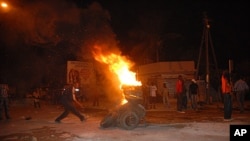The Senegalese capital, Dakar, is relatively calm Sunday, after another night of protests in the city sparked by a court decision allowing President Abdoulaye Wade to stand for re-election. Roads remain closed to stem the violence, and many Senegalese are saying enough is enough.
An atmosphere of calm reigns over Dakar today as its population recovers from two days of protests that rocked the capital.
More young people gathered Saturday night in the Medina district of Dakar to voice their disapproval of the decision by Senegal's highest court that President Abdoulaye Wade can run for re-election.
Fires were lit in the Mamelles district and the road to the airport remains shut down.
But while the military remains on high alert, many breathed a sigh of relief that the violent demonstrations that left a policeman dead and many injured on Friday night were not repeated.
The trouble started almost immediately Friday following the announcement that 85-year-old incumbent President Abdoulaye Wade’s bid to stand for a third term had been approved by the Constitutional Court. The opposition says an amendment to the Senegalese constitution sets a limit of two terms for a president. But Wade says his first term pre-dated the constitutional amendment.
Fires were lit in Medina on Saturday night after the leaders of the M23 coalition, representing all the major opposition candidates running in the election, rallied people to stand up to the decision and “fight” - saying that Wade had declared war on the people.
Amath Dansakho, head of the Independence and Work Party and a member of M23, spoke to the press on Saturday.
Dansakho says we invite the whole population to organize and mobilize to confront Wade. The fight has only just begun. He says we launch a demand to all the political organizations and to civil society to take part in this resistance and we reiterate our appeal to the security forces to stay on the side of the people.
But many Senegalese are openly critical of the kind of violence fomented by a few young people who declared their intention to bring Arab Spring-like unrest to Dakar’s central Place d'Obelisque.
Student Moctar Ba says the opposition is irresponsible to incite young people to riot.
“Here in Senegal we do nt have a good, mature opposition,” he explains. “Because a good opposition should never call on young people to go out into the streets to make trouble. We need an opposition who calls for calm and who gets everyone fired up to go to the election and vote against Abdoulaye Wade.”
Ba says M23 should be encouraging Senegal’s youth to build for the future - not destroy.
For me, a young people who love their country should not be burning it down or killing people because of Abdoulaye Wade. Wade, even if he is the president, is really small in the face of 12 million people, Ba says. "It is all of us who share this country and the youth who should share it and lead it into a healthy future. If we break our country now, it is us who will have the hard task of rebuilding it tomorrow.”
One thing is clear however, the Senegalese almost unanimously want Mr. Wade to go. No one who spoke to VOA believed Wade should be president for a third term, and many blame him directly for causing the violence.
Today, invalidated opposition candidate Youssou N’Dour waits to see whether his appeal will be accepted by the Constitutional Court.
Validated candidate Macky Sall said he is not surprised that Mr. Wade’s candidature was accepted. Now he believes it is a question of going forward despite the president’s claims that the opposition is afraid of him.
It is not a question of being afraid or not afraid, he says. It is a question of respect for the constitution and the law. If he had respected that, we would not be in this position, Sall says. "OK, he is the strongest and the most handsome and all that - but he does not have the right to be a candidate.”
Senegalese will go to the polls on February 26.
Senegalese Decry Pre-Election Violence
- By Jane Labous




